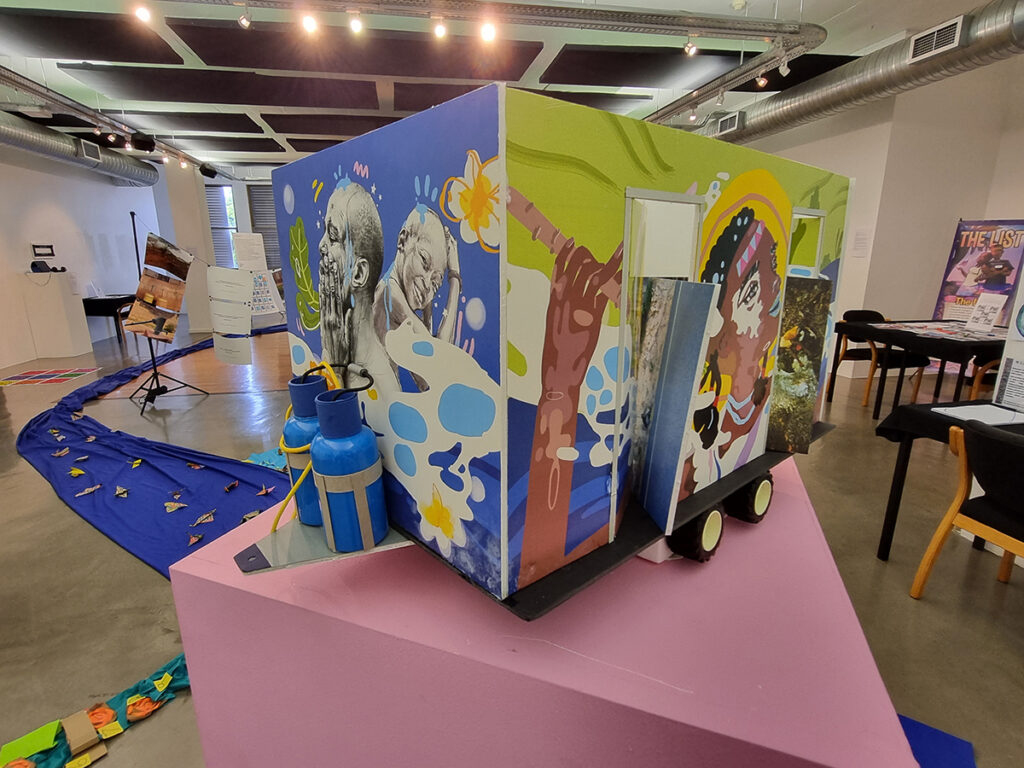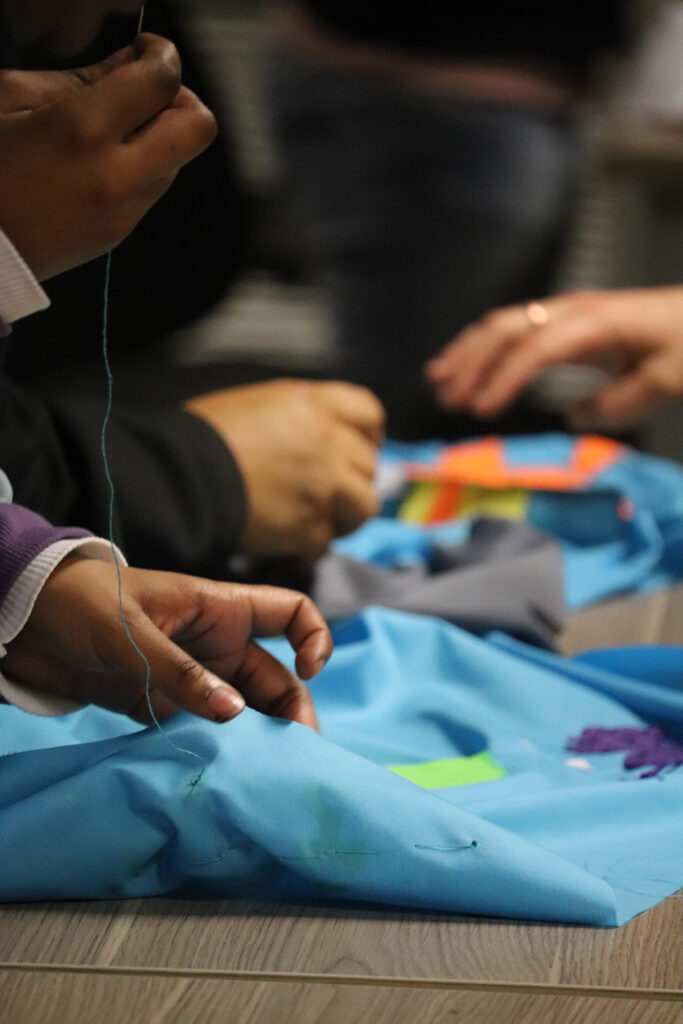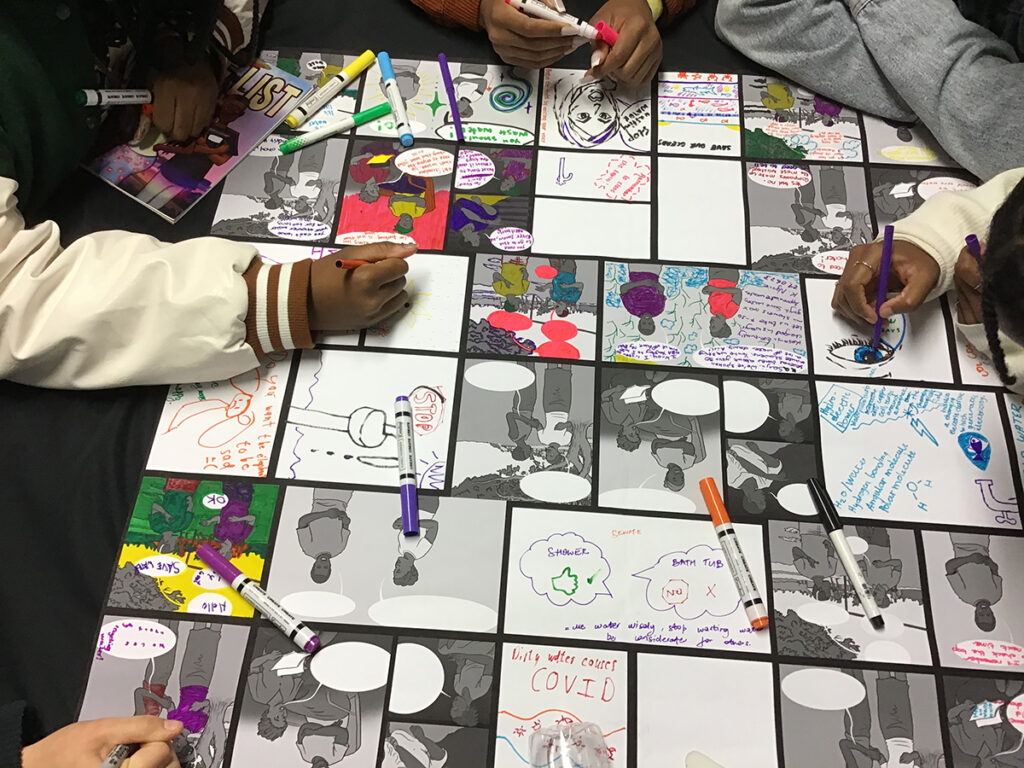International Water Justice exhibit makes its Canadian debut
Categories: Carmen Logie, Faculty, Research
“The Nina Manzi miniature WASH bus” and “How do I get water? Photovoice cards” — see full photo caption, below.
This fall, researchers from the University of Toronto’s Factor-Inwentash Faculty of Social Work are bringing an international art exhibit on water justice to Canada. As the exhibition tours the country, attendees will be invited to interact with sculptures, video, poetry and more – all while learning about an urgent issue linked to climate change and equity.
The travelling exhibit launched this summer in South Africa in conjunction with a conference on water justice hosted by the University of Cape Town’s Future Water research institute. Led by Carmen Logie, a professor of social work at U of T, the events brought together an interdisciplinary group of researchers, including many who use arts-based methods, with activists, artists, local youth and nonprofits.
“We called the conference and exhibit Confluency because of the dual meaning,” says Sarah Van Borek, a U of T postdoctoral research fellow at FIFSW who works with Logie and coordinated the event. “It describes the meeting of tributaries within a larger river, but it can also describe the meeting of perspectives between people from different backgrounds.”
Confluency’s Canadian launch will take place at Western University’s Riverfest in London, Ontario, September 9 th to 26th. Afterwards, it will head to Carleton University in Ottawa, October 9th to 20th, before coming to the Factor-Inwentash Faculty at U of T.
Visitors to the exhibit will find murals, photography, fibre sculptures, comics, poetry, songs, and audio-visual installations. Many of the art pieces were part of research that was presented at the summer conference. These pieces will be presented alongside artwork created by conference attendees who participated in workshops facilitated by nine women from informal settlements and a township in Cape Town. The conference workshops were also supported by artist-mentors, including illustrator Sanelisiwe Singaphi, multi-media artist Tsebo T-flag Mokoena and singer-songwriter Mapumba Cilombo.

Participants create components of the River of Life Sculpture at a 2023 Confluency conference workshop. (Artist credits for this piece are listed at the end of the article, below.)
One particularly striking work is called the River of Life Social Sculpture. Running along the floor, it has multiple sculptures within it, each in the form of a tributary. The sculptures draw on water-related metaphors that represent the challenges and opportunities that were part of the artists’ journeys to water justice. One sculpture, for example, depicts a flood in a community in Uganda; another symbolizes a shopping mall development where two South African rivers meet — a location that is sacred to local Indigenous peoples.
“Interactivity is built into the exhibit, so visitor contributions will become part of the show,” says Van Borek, who, in addition to her work as an arts-based researcher focused on water and wellbeing, is also a media artist and documentary filmmaker. Attendees can stitch a textile mosaic with materials from beach cleanups, dance to songs produced by Kenyan youth, add to a communal comic and write a short poem in response to a work by Rita Wong, an award-winning Canadian poet and water justice activist, among other activities.
The organizers hope participants will walk away with a new or deeper awareness of the concept of water justice, especially as it connects to social justice, and an appreciation of the power of arts-based research methods. “We want attendees to feel like they’ve been a part of this exhibit – that they didn’t just come and check it out,” says Van Borek. “Even if it’s small, they can contribute something that’s going to be carried forward and play a part in addressing the global water crisis.”
The Confluency conference, which was supported by the Social Sciences and Humanities Research Council of Canada, featured academic and community-based researchers as well as practitioners from South Africa, Kenya, Egypt and Canada with expertise in areas ranging from Indigenous knowledge in water justice to participatory water governance. For example, Ajay Paul, director and co-founder of Viva Con Agua South Africa, shared their arts-based work on a human centered design project for mobile water, sanitation and hygiene services for people experiencing homelessness in Cape Town. Dr. Lina Taing, a senior researcher from United Nations University Institute for Water, Environment & Health based at McMaster University, presented on water policy from the ground up.
Several FIFSW researchers were also involved in the conference. Logie, the Canada Research Chair in Global Health Equity and Social Justice with Marginalized Populations at U of T, shared research she conducted with Peter Newman on LGBTQ perspectives on water security in India and Thailand, and Ashley Quinn presented on Indigenous water protectors in Canada. “Whatever their focus, the researchers prioritized engaging people directly affected by the water issue under study and incorporated their experiences and perspectives,” says Van Borek.
Logie, who is also an adjunct professor at the United Nations University Institute for Water, Environment & Health — the only UN think tank on water — is recognized as a leader in using creative and arts-based approaches to come up with solutions to inequity in partnership with communities. “Videos, songs and various forms of visual art are engaging ways to talk about complex issues like water insecurity,” she says. “Art is more accessible for people who may have lower literacy levels, less information about particular topics and language barriers. Researchers can get people to participate in the production of knowledge, but also share knowledge in a fun and interesting way.”

“Create Your Own Water Justice Comic,” invited participants to add their own dialogue to existing comic images or create their own comics in the blank strips provided. (More information provided at the end of the article, below.)
The concept of water justice is gaining attention as climate change increasingly affects the world’s water, from rising sea levels and shrinking ice sheets to floods and droughts. “Water justice is a social justice issue,” says Van Borek. “People’s experiences of water security or insecurity intersect with issues such as race, gender, sexual orientation and economic status. Water justice isn’t just about access to water, though that’s vital, but also the quality of water, which is a big problem in Canada in some Indigenous communities. It also encompasses how water is distributed and managed, and who gets to share and access knowledge about it.”
After the U of T event, the exhibit will move to other universities across Canada, then likely to Europe, where researchers in several countries have expressed interest. “We built this to be a mobile tool that’s available to communities,” says Logie. “We’ve forged so many connections across disciplines and countries with this project, and our aim is to build it into a bigger partnership on water justice.”
Follow Confluency on Instagram @confluency2023.
Article by Megan Easton
:::::::::::::::::::::
2023 Confluency conference art workshop facilitators:
Soeraya Davids
Bulelwa Somlota
Lutfiyah Tities
Chevon Smith
Amanda Leo
Gracia Fortuin
Siwaphiwe Rodolo
Xolelwa (Nomtha) Mkhetho
Nolufefe Tubeni
Confluency Research Team:
Principal Investigator: Professor Carmen Logie, Factor-Inwentash Faculty of Social Work (FISFW), University of Toronto (UofT). Co-applicants: Dr. Lina Taing, the United Nations University’s Institute for Water, Environment and Health at McMaster University; Professor Caetano Dorea, University of Victoria; Professor Peter Newman (UofT FIFSW); and Dr. Lesley Gittings, Western University. Collaborators: Dr. Kirsty Carden, the University of Cape Town’s Future Water research institute; Dr. Gill Black, the Sustainable Livelihoods Foundation; and Distinguished Professor Heila Lotz-Sisitka, Rhodes University’s Environmental Learning Research Centre. Exhibit & conference coordinator: Dr. Sarah Van Borek; Assistant coordinator: & Dr. Amber Abrams. Supported by the Social Sciences and Humanities Research Council of Canada.
Photo, top:
“The Nina Manzi miniature WASH bus,” by Sanelisiwe Singaphi depicts a mobile public WASH (water, sanitation and hygiene) facility that provides persons experiencing homelessness with access to clean water and sanitation facilities. The model bus is displayed with “How do I get water? Photovoice cards” — a photovoice project created with persons experiencing homelessness in Cape Town, led by researchers, Helen Martin (University of Applied Sciences Western Switzerland) and Alberto Caoci (University of Cape Town). Six participants were given a disposable camera and invited to take photos of their daily life involving water. Individual interviews were then conducted with each participant around their photos and 6 photovoices (i.e. pictorial narratives) were made.
River of Live Social Sculpture artists:
Reflection River
Facilitator: Luthfiya Tities
Participants: Prof Bongani Ncube, Sinenhlanhla Ngubane
River Nwamwamba
Facilitators: Nolufefe Tubeni, Bulelwa Somlota
Participants: Megan & Thato Luka-Sithole, Preven Chetty, Zindzi Tendo
River of Hope
Facilitators: Amanda Leo, Nomtha Mkhetho
Participants: Penny Holmes, Karen
The Community River
Facilitators: Siwa Rodolo, Chevon Smith
Participant: Kathrin Krause
Unimaginable River
Facilitator: Soeraya Davids
Participant: Debbie V. der Berg
River Embo
Facilitators: Gracia Fortuin
Participants: Phumelele Muthali, Siwa
Artist-mentor: Tsebo T-Flag Mokoena
About the Create Your Own Water Justice Comic, pictured above:
Confluency exhibited two sets of comics. One of them, entitled The List (designed by Janine Carrinton) is the outcome of an arts-based research project led by Carmen Logie. Researchers developed comic scenarios based on interviews with refugee youth in Uganda. The comics were then used to engage the youth in reflection on emotionally difficult and often stigmatized issues. Using comics is a form of “graphic medicine” that has the potential to help motivate behavioral change, increase knowledge and reduce stigma across a range of health issues.